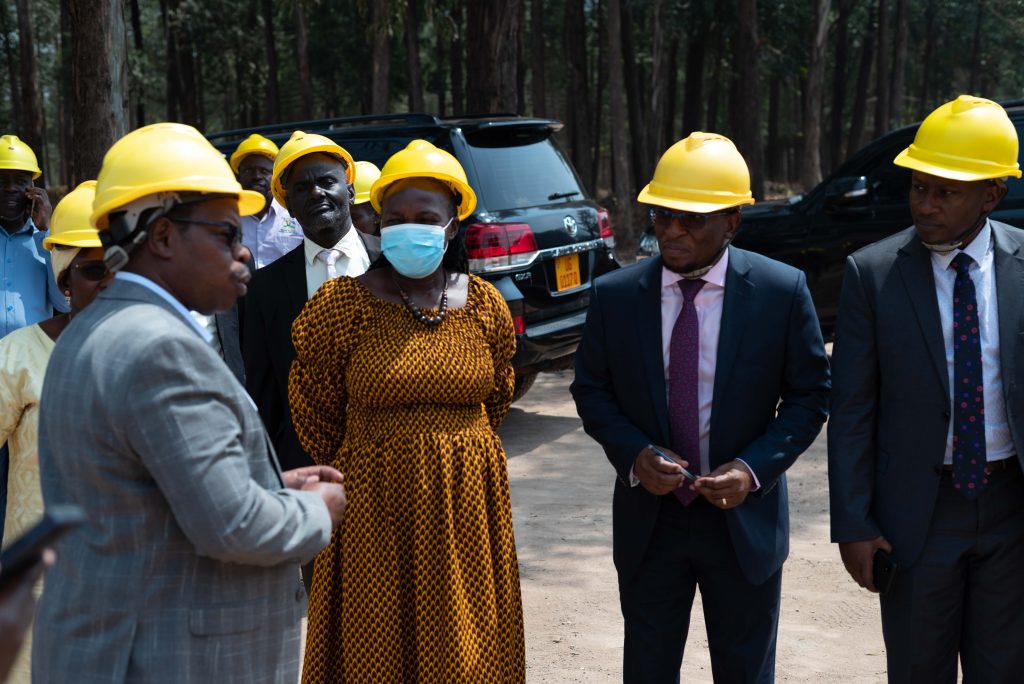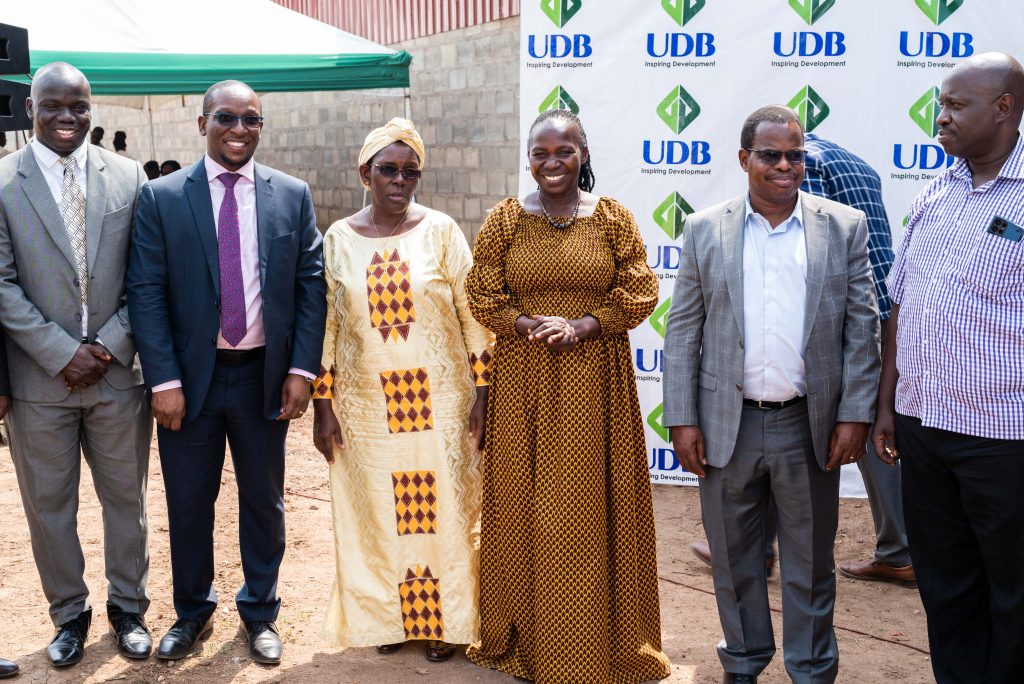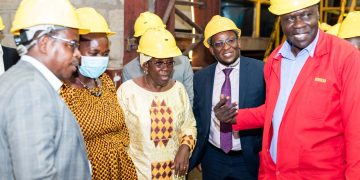10th February 2023 – Hoima: Uganda Development Bank (UDB), the country’s national Development Finance Institution, has announced excellent results for 2022 reflecting strong investment in various businesses across the country, improved livelihoods and heavy support towards the economic recovery and resilience of Uganda.
In 2022, UDB registered a 52% gross loan portfolio growth from Shs851 Billion in December 2021 to Shs1,298 Billion in December 2022. The Bank’s total assets currently stand at UGX1.44 Trillion, growing by 19% from UGX1.21 Trillion at the start of 2022. This growth is on account of growth in funding, mainly through capital allocations from the government and the drawdown of lines of credit from various other funding partners.
“This performance is anchored on the Bank’s deliberate efforts towards the revitalization and transformation of Uganda’s economy,” said UDB’s Managing Director, Patricia Ojangole.
“This gives us confidence that we are on track to achieve our strategic objectives.”
Uganda has lived through major socio-economic shocks in the last three years including Covid-19, adverse climate and the impacts of geopolitical shocks. UDB remains consistent in supporting the government in the delivery of national objectives.
“Our product portfolio has been designed to support key priority sectors to achieve their full potential which aligns with the country’s strategic direction and National Development Plan III,” Ojangole said.
Approvals
The value of new loan applications approved to receive funding grew by 40% against the 2021 performance registering a total of Shs894 Billion from the Shs635 Billion registered in 2021.
The Industry sector (comprising of manufacturing and agro-industry) received the highest number of approvals worth Shs454.75 Billion with primary agriculture receiving Shs96.75 billion.

Disbursements
The Bank disbursed a total of Shs776.6 billion during the year 2022, improving by 81% from Shs428 billion disbursed in the previous year 2021. Of this sum, 76% was disbursed to projects engaged in agriculture, agro-processing and manufacturing.
Supporting underserved sectors of the economy
In 2022, the Bank launched the Special Programs intervention which has effectively implemented several strategies, with a focus on channelling interventions to promote small and medium-sized firms (SMEs), as well as businesses run by women and youth within the Bank’s supported sectors.
After a year of implementation, the Bank approved over UGX31.5 billion, with 128 enterprises (including 42 women-owned) benefitting from this program under this program.
To further support these businesses, the Bank further launched the Business Accelerator for Successful Entrepreneurship (BASE) aimed at preparing entrepreneurs for financing through enhanced business practices.
“In 2022 alone, 08 regional training sessions targeting 1,130 SMEs were conducted in Kampala, Mbarara, Fort Portal, Lira, Gulu, Arua, Masaka, and Mbale districts. As a result of these sessions, the Bank identified funding prospects amounting to Shs147.3 billion. Additionally, 77 hitherto informal enterprises undertook various business formalization processes – with 45 registering their business names and 37 others formally registering as new taxpayers or for tax certification,“ Ojangole says.
“Conversely, the Bank earmarked 274 enterprises to participate in the inaugural UDB Business Incubation Program to be held this year, the aim of which is to facilitate the incubatees to be credit-ready, and potentially prospective customers of UDB.“
Direct Impact of our intervention
UDB’s mandate is to accelerate social economic development in the country through sustainable financial interventions. Consistent with its mandate, the Bank supports projects within the private sector that demonstrate the potential to deliver high social economic value, in terms of job creation, improved production output, tax contribution and foreign exchange generation among other outcomes.

The projects approved for the year are expected will generate 35,372 new direct jobs, and Shs9.35 Trillion Billion worth of output value/turnover from firms financed. These are further expected to generate Shs393.79 Billion in tax revenue for the government and attract foreign exchange earnings of Shs1,58 Trillion. 72% of the 249 projects are within primary agriculture, agro-processing and manufacturing.
| Sector | Jobs | Output value
(UGX Bn) |
Tax
(UGX Bn) | Forex
(UGX Bn) |
| Tourism | 1,186 | 65.97 | 6.98 | 8.8 |
| Infrastructure | 2,468 | 3,083.24 | 15.1 | 30.5 |
| Agro-Processing | 6,734 | 2,371.71 | 189.1 | 739.8 |
| Manufacturing | 16,293 | 2,935.2 | 125.4 | 791.3 |
| Primary-Agriculture | 7,928 | 576.6 | 50.8 | 8.7 |
| Health | 176 | 28.2 | 2.2 | 0.79 |
| Education | 96 | 1.4 | 0.2 | 0.0 |
| Others | 491 | 288.0 | 4.1 | 0.0 |
| Total | 35,372 | 9,350.42 | 393.79 | 1,579.9 |
Speaking at the event, Hon. Jenepher Namuyangu, Minister of State for Bunyoro Affairs mentioned, “I would like to take this opportunity and thank the management and staff of UDB for extending support to all regions of the country and specifically to the agriculture sector because Uganda is an agrarian country. The government recognizes the efforts of stakeholders like UDB who intervene in accelerating the growth of key sectors like; agriculture, tourism, and human capital development, among others which are in line with the government’s National Development Plan 3 (NDP III).”
She added: “I am pleased to know that Bwendero Dairy Farm is a beneficiary of funding from UDB, and I believe the support has enabled them to expand their operations and, in the end, improve the livelihoods of our people in Hoima and the surrounding areas who are directly or indirectly impacted by the existence of Bwendero Dairy farm.”
Mr. John Magara, the proprietor of Bwendero Dairy Farm, appreciated the Bank for the support which has enabled them to install a sugar plant in Kitoba Village Hoima District which operated at 38.6% in 2021 and whose performance has since greatly improved doubling to 77.3%, producing 580 tons per day in 2022.
“The farm has been able to diversify its operations to sugar processing, distillery, and milling, hence producing brown sugar, maize flour, and pharmaceutical ethanol, among others,” Magara disclosed.









